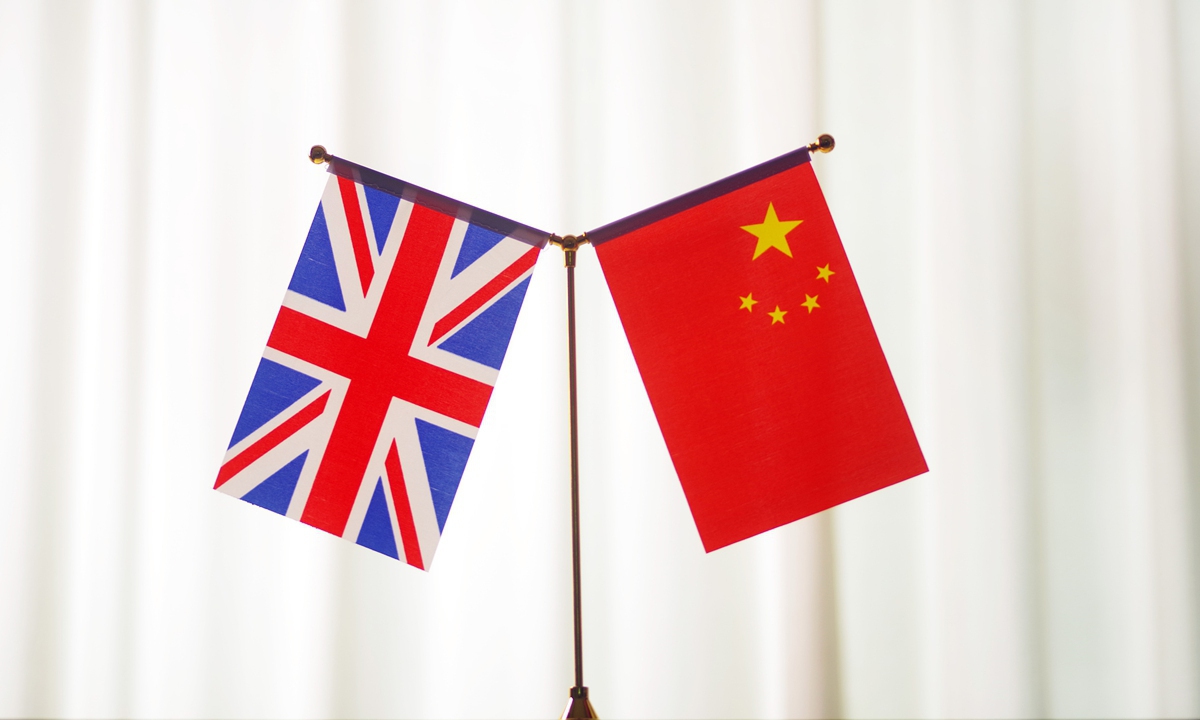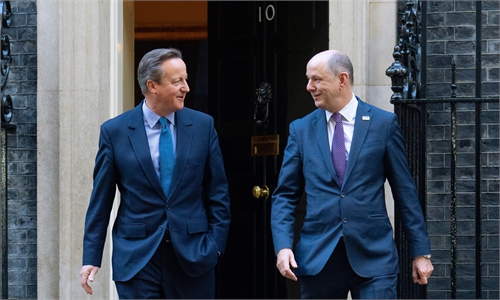Chinese FM highlights engagement in talks with UK's Cameron, 'a positive signal' for mending ties

China UK Photo: VCG
Chinese Foreign Minister Wang Yi stressed the importance of a stable and healthy China-UK ties and cooperation, expressing the hope that the British side will establish a correct understanding of China, during a phone call with British Foreign Secretary David Cameron on Tuesday, ahead of Cameron's US trip starting on Wednesday.
Chinese experts view the conversation as positive, which shows that in the context of an atmosphere of detente between China and the US, and China and the EU, the British government is seemingly attempting to adjust the hawkish China policy it has adopted since the Boris Johnson administration, seek for more pragmatic and cooperative bilateral ties to alleviate the pressure on the economy, and find a more suitable place for the UK in the relationship between China and the US.
In the phone call at the invitation of Cameron, Wang said the steady and sound development of bilateral relations not only serves the fundamental and long-term interests of the two peoples, but also has strategic and global significance for promoting world peace and prosperity.
China and Britain offer development opportunities to each other, Wang noted, expressing the hope that the British side will establish a correct understanding of China and grasp the general direction of the development of China-Britain relations.
In the face of the ever-changing international situation and emerging global challenges, he stressed, China and Britain should maintain communication and dialogue, strengthen coordination and deepen cooperation, Wang said.
For his part, Cameron said in today's world, no single country can tackle global challenges alone, and the engagement and cooperation between Britain and China serves the interests of both sides. Britain is committed to developing relations with China and is willing to maintain exchanges, he added.
Li Guanjie, a research fellow with the Shanghai Academy of Global Governance and Area Studies under the Shanghai International Studies University, said that compared with previous cabinets since Boris Johnson, Cameron's call with Wang Yi before his visit to the US was a breakthrough.
Cameron is normally viewed as a politician with a constructive and open attitude toward cooperation with China. During his tenure as prime minister from 2010 to 2016, Cameron heralded a "golden era" in ties with China.
Gao Jian, an expert on European studies at Shanghai International Studies University, told the Global Times that the signals are unquestionably positive, indicating the Sunak government's intention to pursue a more pragmatic and cooperative China-Britain bilateral relationship.
Perhaps there is a possibility that the Downing Street needs Cameron to allay US strategic concerns before actually adopting a "relatively positive" policy toward China, Gao said.
The US-UK relationship is prioritized in the Downing Street diplomatic landscape. But that does not mean the UK wants to entirely rely on the US, he said.
Judging from the diplomatic practice of the past few years, there is not much practical benefit for the UK to follow the US, which has always emphasized so-called values-based diplomacy and bloc confrontation, Li said.
Saving a stagnant economy and improving people's livelihood are two things that the US cannot bring to the UK. The improvement of relations with China, especially in investment and trade, is what the British people and the business community would like to see, Li said.
According to a Telegraph article on Tuesday, the UK has become the only rich nation where food prices are rising by more than 10 percent. Junior doctors in England on Tuesday announced new strike dates after the government failed to make a credible pay offer.
Experts believe it is natural for the UK to think about increasing its engagement with China after an atmosphere of detente between China and the US, and China and the EU has formed. There may be hints of detente between Beijing and London, but there is still a lack of substantial movement in both commerce and diplomacy.
Once Sunak initiates a detente toward China, it would likely attract opposition from hawks within both the Conservatives and the Labour Party, and could lose their support in next year's election, Li said. "But on the other hand, the realities of the economy need Britain to strengthen cooperation with China, which may also bring the British business community's vote support," Li said.
"This makes the Sunak cabinet very cautious in dealing with the relationship with China," Li said.
The expert noted that a Cameron visit to China is not unrealistic. "Cameron may have the will, and China will welcome it if both sides can restart and advance political and economic dialogues, as well as people-to-people exchanges."


